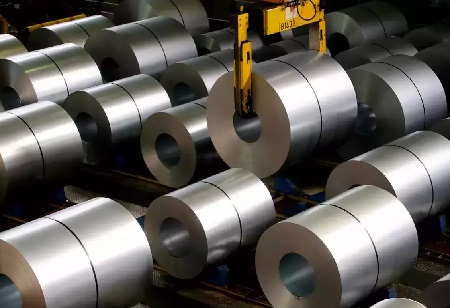Steel prices in the domestic market have fallen by almost a tenth in the two weeks since the Centre levied export duty on the alloy, a trend underscored by the seasonal slowdown in demand.
Prices of domestic benchmark hot-rolled coil (HRC) steel at the traders’ end have slipped by about 8% or 5,500 to about 63,800 per tonne since May 18, according to SteelMint, a market intelligence agency. Top steelmakers have also quoted prices for June that are lower by 4,500–5,500 a tonne, said people with knowledge of the matter.
The government levied a 15% export duty on steel, effective May 22, to rein in prices in its bid to arrest inflation. It also levied a steep duty on the export of iron ore while cutting the import duty on key raw materials such as coal to reduce the cost of steel production. While these measures have helped tame prices in the domestic market, the decline began before the changes.
"Globally too, prices have been correcting," said Ranjan Dhar, chief marketing officer, ArcelorMittal Nippon Steel India.
“Prices have come down in the US, UK, and China, thus there is a correction in India too,” Dhar said. "We totally understand and appreciate the government's concern on inflation and hope with these corrections, which have already happened, these concerns are more than addressed."
A drop in coking coal prices worldwide and the US Federal Reserve’s stimulus withdrawal are among the reasons for prices falling, he said. Steelmakers have also taken measures such as fixed-price contracts for infrastructure projects and price support for MSMEs, cushioning the impact of high steel prices on customers, he said.
HRC steel hit a peak of Rs 78,800 per tonne in the first week of April and has since been dropping at a rate of Rs 2,000-3,000 per week, according to Kalpesh Padhiar, senior associate for research at SteelMint. The rate of reduction in steel prices has picked up since the export duty levy, he said.
One redeeming feature for steelmakers without captive iron ore mines has been that the cost of its main raw material has also moved southwards. Iron ore and iron ore pellets are down 16-20% in Odisha. State-owned iron ore producer NMDC has also cut its notified price for fine ore by Rs 750 a tonne for June contracts.
Meanwhile, international coking coal prices have come down to $485 a tonne after touching an all-time high of $600 a tonne in September 2021, according to experts.
"Iron ore prices are correcting, and coking coal prices are also coming down from (the) peak," said Edelweiss research analyst Amit A Dixit. "Demand has been plateauing for the past months. We expect further fall in steel prices going forward."
Analysts and industry experts are bracing for a margin squeeze in the coming quarters.
"Margins are going to be hit significantly. In the last quarter, average margins were around Rs 13,000-Rs 19,000 a tonne. However, it is likely to fall by around Rs 5,000-6,000 a tonne in Q2 and further in the coming quarters," said an executive at a top steelmaker who didn’t want to be named.
Prices are likely to go lower and events in China will determine outcomes.
"With the seasonally weak demand period looming, we might see prices coming off further," Edelweiss said in a recent report. "As a result, despite a stable Q1of FY23, we expect margins in Q2 of FY23 to come under pressure along with subdued demand. We would keep close tabs on the developments in China on both lockdown easing and production control as there could be a profound impact on prices."
